|
|
|
Sort Order |
|
|
|
Items / Page
|
|
|
|
|
|
|
| Srl | Item |
| 1 |
ID:
137640
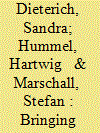

|
|
|
|
|
| Summary/Abstract |
Referring to Kant’s ‘Perpetual Peace’, research on the democratic peace is based on the assumption that citizens’ preferences are fully and directly transferred into actual security policy by democratic leaders. However, democratic responsiveness in foreign politics is a more complex issue. Parliaments are usually key institutions with regard to ensuring responsiveness of democratic leaders both by authorizing political decisions and by monitoring executive policymaking and implementation. However, in several democracies military security policy-making is understood as part of an ‘executive prerogative’. This article examines the role of parliaments in providing for democratic responsiveness of security policy-making. We test the hypothesis that, depending on the extent of their ‘war powers’, parliaments do effectively limit the scope of executive security policy if and when public opinion strongly opposes military action. The decision-making of 25 European democracies on military participation in the 2003 Iraq War serves as a test. Testing the hypothesis we find that countries with strong parliamentary war powers tended to be significantly less involved in the military intervention against Iraq. However, several puzzles of a theory of ‘parliamentary peace’ remain to be addressed by future research.
|
|
|
|
|
|
|
|
|
|
|
|
|
|
|
|
| 2 |
ID:
120510
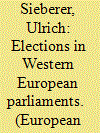

|
|
|
|
|
| Publication |
2013.
|
| Summary/Abstract |
Parliaments often elect holders of important extra-parliamentary offices such as heads of state, constitutional judges, heads of audit institutions and ombudsmen. What drives the behaviour of parliamentary actors and the outcome of such elections? This article explains actor behaviour theoretically, drawing on spatial factors, principal-agent arguments about the importance of nonspatial candidate characteristics and signaling arguments about competitive considerations beyond the specific election. Empirically, it provides the first comparative analysis of such elections outside the United States Senate using original data on 100 elections for four external offices in 14 Western European parliaments. The findings show that spatial variables, nonspatial candidate characteristics and features of the competitive context systematically affect the election outcome. The article contributes to comparative parliamentary research in general by demonstrating how parliamentary activities, other than lawmaking, can be analysed using established theories and by showing that consensual aggregate outcomes can be explained within a competition-based rational choice model.
|
|
|
|
|
|
|
|
|
|
|
|
|
|
|
|
| 3 |
ID:
137626
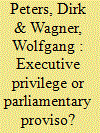

|
|
|
|
|
| Summary/Abstract |
Parliamentary oversight of the military constitutes an important element of the civilian control of the armed forces. However, the strength of parliaments in this realm varies greatly across democracies and little is known about the sources of this variation. We propose an explanation for one key aspect of this variation: why does parliament enjoy veto power over military deployments in some democracies but not in others? Our analysis of data from forty-nine democracies around the world suggests that at least three factors account for parliamentary strength or weakness in this realm: the external threat to which a country is exposed, its constitutional tradition, and the experience of severe military failure in the past.
|
|
|
|
|
|
|
|
|
|
|
|
|
|
|
|
| 4 |
ID:
170411


|
|
|
|
|
| Summary/Abstract |
Developed and developing countries are increasingly cooperating on migration management, and human rights NGOs have harshly criticised these instruments for cooperation. This article asks how and to what extent parliaments are challenging policies for international cooperation on migration management. On the one hand parliaments have traditionally been described as ‘moral tribunes’ in international relations, due to their principled support for human rights. On the other hand, parliaments are increasingly operating in political systems marked by anti-immigrant sentiment and increased support for right-wing populist parties. How do parliaments navigate between these two poles when it comes to international cooperation on migration management? Based on examples from Australia, the EU and Israel, this article shows that the use of non-legally binding instruments for cooperation limits the formal role of parliaments, but also and more importantly that there is a lack of political will to scrutinise these instruments and hold executives to account (notwithstanding attempts by some members of parliament or some political groupings to challenge policies through informal means). The lack of political contestation implies that, as far as migration management is concerned, ‘politics stop at the water's edge’.
|
|
|
|
|
|
|
|
|
|
|
|
|
|
|
|
| 5 |
ID:
175135


|
|
|
|
|
| Summary/Abstract |
Ethnic and religious minorities have played a significant role in the long history of Kurdistan. At an official level, their political position was significantly strengthened with the advent of autonomy for the Kurdistan Region in northern Iraq in 1992. Most importantly, a quota system was established that reserved seats for several minority groups in the Kurdistan Parliament, often cited as an example of tolerance for diversity and respect for minority rights. Nevertheless, there is a lack of empirical research examining how ethnic and religious quotas affect democratic stability, quality of representation, and opportunities to represent authentic interests within the Kurdistan Regional Government (KRG). The politicians who occupy the reserved seats have come under criticism for merely supporting the policy programs of the dominant Kurdish parties, which deprives ethnic and religious minority groups of authentic representation and exposes the minority parties to allegations that they are politically exploited. This article analyzes the dynamics of minority political participation in Iraqi Kurdistan, how representation has been affected by the dominance of the ruling parties, and factors that guide the behavior of minority politicians while serving in quota-allocated positions. It also examines the effects of reserving seats through the quota system on the political behavior of minority groups. To these ends, this article focuses on parliamentary quotas and their impact on democratic stability, decision-making, and the empowerment of minority groups in the Kurdistan Region.
|
|
|
|
|
|
|
|
|
|
|
|
|
|
|
|
| 6 |
ID:
110771


|
|
|
|
|
| Publication |
2011.
|
| Summary/Abstract |
One of the key themes in recent discussions about the EU's foreign and security policy has been the question of Europeanization. This article seeks to contribute to this field of research by investigating the way in which a single EU military crisis management operation, the EUFOR Chad/CAR, has been perceived and debated on a national parliamentary arena in two member states, Sweden and Finland. The results suggest that a marked discontinuity prevailed between these nations' policies in the context of the CSDP/ESDP and the discourse on CSDP/ESDP in the respective parliaments. While highlighting the need to pay more attention to the domestic dimension of Europeanization, these findings also call into question some of the basic premises of the discussion on Europeanization.
|
|
|
|
|
|
|
|
|
|
|
|
|
|
|
|
| 7 |
ID:
143592
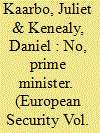

|
|
|
|
|
| Summary/Abstract |
On 29 August 2013, the UK House of Commons inflicted the first defeat on a Prime Minister over a matter of war and peace since 1782. Recalled to debate and vote on UK intervention in Syria, the Commons humbled the government and crucially impacted the development of UK foreign policy. This article places that vote, and the developments leading to it, in the context of the role of parliaments in security policy and explores the relationships between parliamentary influence, leadership, intra-party and intra-coalition politics, and public opinion. From an in-depth analysis of leaders’ statements and parliamentary debate, we find a combination of intra-party politics and party leadership were most significant. An additional factor – the role of historical precedent – was also important. Our analysis explores the fluidity and interconnectedness of the various factors for parliamentary influence in foreign policy and offers directions for future theoretical development and empirical research.
|
|
|
|
|
|
|
|
|
|
|
|
|
|
|
|
| 8 |
ID:
134065
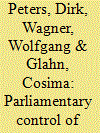

|
|
|
|
|
| Publication |
2014.
|
| Summary/Abstract |
Parliamentary involvement remains a key tool for the democratic control of executive policies. This article explores the web of parliamentary involvement in decision-making on European Union (EU) military operations, using insights gained in an in-depth case study on the EU's anti-piracy mission Atalanta. We find that parliaments at all levels became involved only after key political decisions had already been made. At the member state level, we find highly uneven involvement with only some parliaments being very well informed and closely monitoring, if not influencing government policy. The European Parliament became active only after the launch of the mission but then scrutinised it intensely, profiting (in contrast to national parliaments) from its access to top military officials and key decision-makers. Finally, transnational parliamentary assemblies as well as more informal networks provided opportunities to transmit information across the boundaries of individual parliaments and party-groups thus potentially enhancing the ability of parliamentarians to scrutinise government policies.
|
|
|
|
|
|
|
|
|
|
|
|
|
|
|
|
| 9 |
ID:
162014


|
|
|
| 10 |
ID:
053090


|
|
|
| 11 |
ID:
181636
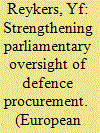

|
|
|
|
|
| Summary/Abstract |
This paper asks: to what extent can a dedicated or special committee with access to classified information empower parliaments to oversee major defence procurement decisions? These decisions often involve a mixture of political, military, economic and societal interests. Particularly after episodes of contestation or controversy, questions tend to arise about how to empower parliaments. The central argument in this paper is that being institutionally empowered and incentivised does not guarantee rigorous oversight. The availability of expertise is an oft-ignored factor in studies of parliamentary oversight. An analysis of oversight behaviour by the Belgian Federal Parliament during the acquisition of new fighter jets (2015–2018) shows that members of parliament also need to be capable of mobilising the necessary expertise in order to translate technical information in such a way that it allows them to influence decision-making, which is often executive-dominated. In this way, this paper contributes to managing expectations about the capacity of parliaments to cope with complex military problems.
|
|
|
|
|
|
|
|
|
|
|
|
|
|
|
|
| 12 |
ID:
095639
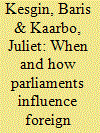

|
|
|
|
|
| Publication |
2010.
|
| Summary/Abstract |
Turkey's decision on its role in the Iraq war in 2003 illustrates the power-and limits-of parliaments as actors in foreign policy. Traditionally, assemblies are not seen as important players in the foreign policies of parliamentary democracies. Instead, cabinets are generally considered the chief policymaking authorities. If the government enjoys a parliamentary majority, legislatures typically support the cabinet, if they are brought into the process at all. The March 1, 2003 vote by the Turkish parliament to not allow the United States to use Turkey as a base for the Iraq invasion challenges this conventional wisdom on parliamentary influence (in addition to many interest-based explanations of foreign policy). This paper examines this decision in the context of the role of parliaments in foreign policies and explores the relationships between parliamentary influence, leadership, intraparty politics, and public opinion
|
|
|
|
|
|
|
|
|
|
|
|
|
|
|
|
|
|
|
|
|